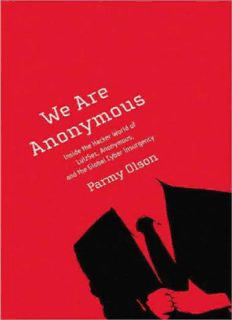Table Of ContentBegin Reading
Table of Contents
Copyright Page
In accordance with the U.S. Copyright Act of 1976, the scanning, uploading, and electronic sharing of any
part of this book without the permission of the publisher constitute unlawful piracy and theft of the author’s
intellectual property. If you would like to use material from the book (other than for review purposes), prior
written permission must be obtained by contacting the publisher at [email protected]. Thank you
for your support of the author’s rights.
For Avó
Before you read this book
Names
Most of the real names and online nicknames used in this book are real, but a
few are not. All fabricated names in this book relate to “William,” a young man
living in the UK whose nightly attempts to prank and harass people give us a
peek into the world of 4chan’s most popular discussion board, b. His name and
the names of his victims have been changed.
Sourcing
Most of the information and anecdotes in this book are sourced directly from
interviews with those who played key roles in the story, such as Hector “Sabu”
Monsegur and Jake “Topiary” Davis. However, hackers are known to
occasionally share nicknames to help obfuscate their identities or even flat-out
lie. As such I have attempted to corroborate people’s stories as much as time has
allowed. When it comes to personal anecdotes—Sabu’s stop-and-search
experience with the NYPD, for example—I have indicated that this is the
hacker’s own testimony. In my year of gathering research for this book, certain
hackers have proved themselves more trustworthy than others, and I have also
leaned toward the testimony of sources I deem most reliable. Notes on the
sourcing of key pieces of information, media reports, and statistics are found at
the back of this book.
Spelling
To help maintain story momentum, I have cleaned up spelling and some
grammar for quotes that were sourced from chat logs and have been used for
dialogue between characters. In cases where I have interviewed people on
Internet Relay Chat, I have also cleaned up spelling; however, if a source
skipped a word or two, I have framed brackets [ ] around the implied words.
People
A few of the people featured in this book are figureheads in Anonymous, but
they are not representative of Anonymous as a whole. It is worth saying that
again: they are not representative of Anonymous as a whole. Some key
characters, like William or Sabu, have volatile personalities, and in hearing their
extraordinary stories, you, the reader, will come to learn about social
engineering, hacking, account cracking, and the rise of the online disruptor
perhaps more engagingly than if you read about these techniques alone. There
are many people in Anonymous who are not the subject of police investigations
like the ones featured in this book, and they also seek to uphold genuine
standards of legality and political activism. For other perspectives on
Anonymous, keep an eye out for work by Gabriella Coleman, an academic who
has been following Anonymous for several years, and a book on Anonymous by
Gregg Housh and Barrett Brown, due out in 2012. The documentary We Are
Legion by Brian Knappenberger also gives more focus to the political activism
of Anonymous.
Part 1
We Are Anonymous
Chapter 1
The Raid
Across America on February 6, 2011, millions of people were settling into their
couches, splitting open bags of nachos, and spilling beer into plastic cups in
preparation for the year’s biggest sporting event. On that Super Bowl Sunday,
during which the Green Bay Packers conquered the Pittsburgh Steelers, a digital
security executive named Aaron Barr watched helplessly as seven people whom
he’d never met turned his world upside down. Super Bowl Sunday was the day
he came face-to-face with Anonymous.
By the end of that weekend, the word Anonymous had new ownership.
Augmenting the dictionary definition of being something with no identifiable
name, it seemed to be a nebulous, sinister group of hackers hell-bent on
attacking enemies of free information, including individuals like Barr, a husband
and a father of twins who had made the mistake of trying to figure out who
Anonymous really was.
The real turning point was lunchtime, with six hours to go until the Super
Bowl kickoff. As Barr sat on the living room couch in his home in the suburbs of
Washington, D.C., dressed comfortably for the day in a t-shirt and jeans, he
noticed that his iPhone hadn’t buzzed in his pocket for the last half hour.
Normally it alerted him to an e-mail every fifteen minutes. When he fished the
phone out of his pocket and pressed a button to refresh his mail, a dark blue
window popped up. It showed three words that would change his life: Cannot
Get Mail. The e-mail client then asked him to verify the right password for his e-
mail. Barr went into the phone’s account settings and carefully typed it in:
“kibafo33.” It didn’t work. His e-mails weren’t coming through.
He looked down at the small screen blankly. Slowly, a tickling anxiety
crawled up his back as he realized what this meant. Since chatting with a hacker
from Anonymous called Topiary a few hours ago, he had thought he was in the
clear. Now he knew that someone had hacked his HBGary Federal account,
possibly accessing tens of thousands of internal e-mails, then locked him out.
This meant that someone, somewhere, had seen nondisclosure agreements and
sensitive documents that could implicate a multinational bank, a respected U.S.
government agency, and his own company.

